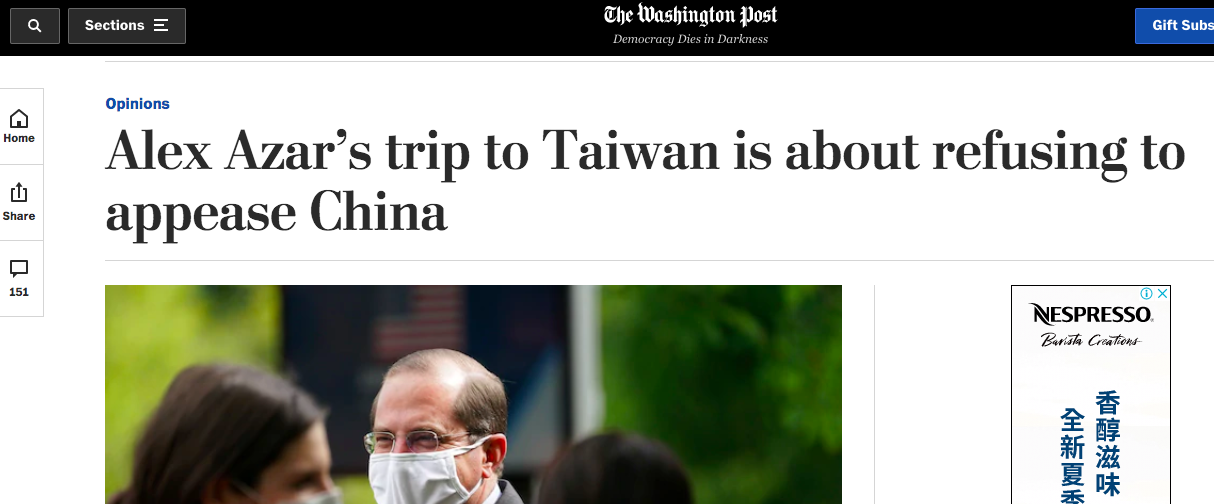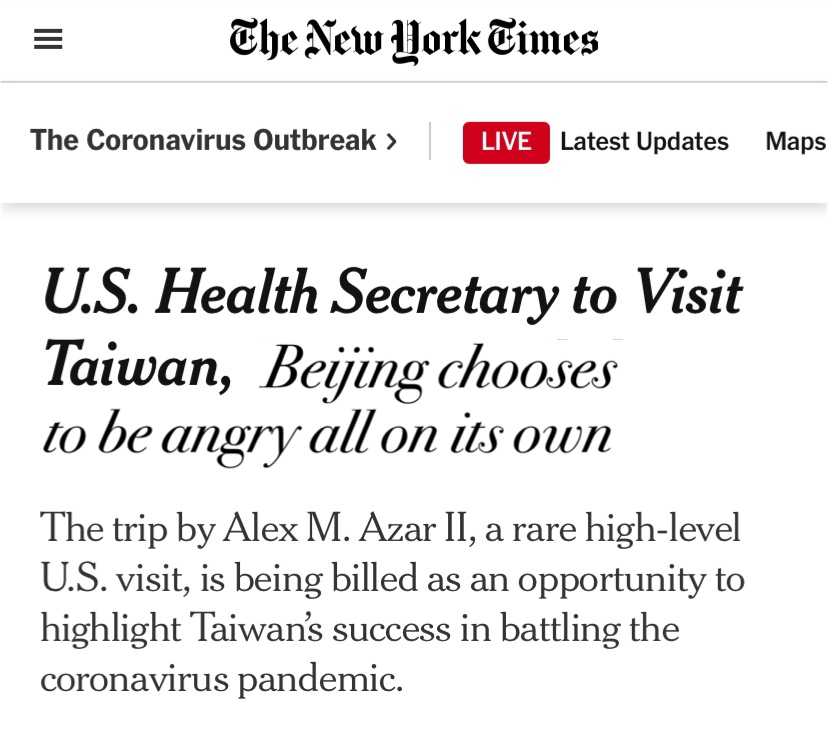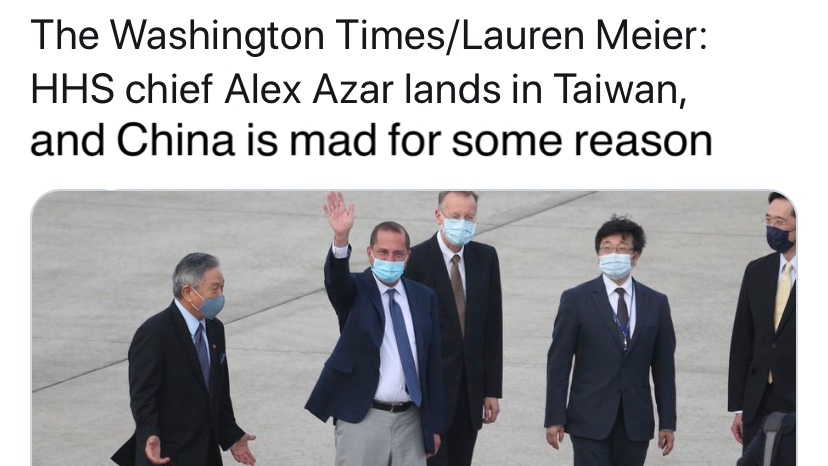If you need this explained to you like Richard Dawkins needs explanations of literature, China is the shark.
Two articles appeared recently over Taiwan's vaccine struggles amid a global shortage, one in Nikkei Asia and one in The Guardian. Both articles are fine, though they both get the same thing wrong (which I'll address later). They both cover how Taiwan's attempts to secure enough vaccines to beat the outbreak have turned into a political imbroglio.
However, the media narrative from both can be examined through the titles that editors chose for them, and that's what I'd like to look at. How does an article about Taiwan where the media outlet wishes to center Taiwan craft a headline, compared to an article about Taiwan where editors are stuck in the past and feel they must stick to tired cliches about the Taiwan-China relationship?
Both do the right thing by questioning China's narrative, or by putting it in parentheses, like this:
China’s altruistic statements have been somewhat contradicted by its objections to the US and Japan donations, and by Taiwanese allegations (which China denies) that it actively blocked a deal Taiwan was working on with the German vaccine producer BioNTech.
This is great: it shows increased interest in and reporting on Taiwan by major international media, and it shows more willingness to look at the Taiwanese perspective or at least consider it through an international or local, rather than Chinese, lens. While international reporting on Taiwan is still tied to China, it's no longer guaranteed to follow the script that China puts forward. That's an improvement.
However, I will come out and say that the Asia Nikkei piece is superior to the Guardian one. This is not a slight against Helen Davidson, and I'm not trying to pit her against Erin Hale. Rather, the issue is with the titles.
Asia Nikkei:
Vaccines become political as Taiwan wakes up to COVID reality
President Tsai's approval rating drops as island struggles to procure doses
This isn't great news for Taiwan, but it is a good headline. It's neutral, and it centers Taiwan. China enters the narrative in the actual article, as it must (because it's the one doing the politicizing, with the help of the KMT and their various compradores) but the reader of this article is brought in through a focus on Taiwan.
Skimmers who just read the headlines will come away with that with a reasonably accurate view that something dodgy is going on with vaccine procurement in Taiwan, and might click to find out what those struggles are. Then they learn that the struggles are caused in part by a global shortage, but also Chinese interference.
Compare that to The Guardian:
How Taiwan’s struggle for Covid vaccines is inflaming tensions with China
As island faces new outbreak and mistrust of Chinese jabs, Beijing objects to donations from US and Japan
This headline sucks.
I want to make it clear that headlines are almost always written by editors; writers rarely get a say in them. This is not a jab at Helen Davidson (it is a jab at her editor, but I don't know who that person is.)
It sucks because it totally bungles who is doing the inflaming of what. "Taiwan's struggle for coronavirus vaccines" is not inflaming tensions with China. China is inflaming tensions over Taiwan's vaccine struggle. This is an active choice on the part of the Chinese government, which does indeed have free will.
All Taiwan is trying to do is get some damn vaccines. They don't want to play political games or "inflame" anything. And tensions aren't gout. They don't inflame on their own. Someone has to inflame them. That someone is China.
The subtitle isn't great either. It's not wrong per se, but the reader is invited to wonder "why would Taiwan distrust Chinese vaccines?" If they don't really know a lot about Taiwan/China issues, and the headline has not clarified that China is the inflamer (not the inflamee) they might preemptively conclude that Taiwan is being unreasonable, when it is not.
It also centers Beijing's reaction to the US and Japanese donations, rather than how these have affected the Taiwanese situation, even though the article is ostensibly about Taiwan. China starts out being centered, and the reader is then invited to keep centering China.
The actual article is a lot better -- again, this isn't about Davidson's work -- but someone really ought to inflame tensions with the Guardian editors.
You may be curious what the two articles get wrong. It's relatively minor, but worth pointing out one last time. Both include some version of this narrative:
China said Fosun – the Shanghai-based manufacturer with exclusive regional production rights for Pfizer/BioNTech – had offered to supply Taiwan, but Taiwan had refused.
[Drew] Thompson said there were scientific and transparency concerns about China’s vaccines, which made it unsurprising and potentially sensible for Taiwan to reject an offer of Chinese-developed vaccines. But if the Fosun offer is legitimate, refusing it is “entirely political”.
Clearly, Thompson doesn't actually know that Fosun never made a legitimate offer. To distribute your drug in Taiwan, you need to apply through the Taiwan FDA. It is possible to do this, though as Terry Gou is finding out, you can't just leave out important documents.
Fosun never applied. So it never offered those vaccines to Taiwan in any capacity that Taiwan could officially accept. How can Taiwan reject an offer it never actually received?
I explore this process in more detail here, by the way.
Hale's article also commits this error, and includes discussion of vaccines actually manufactured in China, not Germany. I can't quote it because I've hit the paywall on Asia Nikkei (I read the article days ago), but it leaves out the fact that Chinese-made drugs are banned in Taiwan, by law. To accept drugs made in China would require changing the law. That's not going to happen. The German-made doses are a gray area, but Fosun would still need to apply. To date, it has not done so.
A minor point, but one I wish the international media would get this point right.
I'm also really starting to wonder about this Thompson fellow in the Guardian article, however. He says:
“Pfizer and BioNTech have a huge incentive to ensure that the Fosun product is equivalent, so I would think there is no concern,” he said. “There’s no reason not to take it.”
But he himself provides a very good reason just a few paragraphs up:
If Taiwan accepted Chinese vaccines it would be the political “kiss of death for the DPP [Taiwan’s ruling party]”, Thompson said. “It’s quite likely China would take some sort of gratuitous swipe … see it as a capitulation or recognition of Beijing’s superiority.”
Right -- how is that not a good reason not to take this "offer"? Why is Thompson spinning this as somehow Taiwan's fault?
This is not entirely political: it's also about public health and safety.
China does indeed have every reason to try to harm Taiwan, including tampering with vaccines. And of course, the main reason Fosun never applied is probably because it would require a level of submission that national governments require, not regional ones. Fosun can't just treat Taiwan like Hong Kong and Macau, but to apply, it would essentially have to admit that Taiwan is a place not controlled by China.
So instead it uses its doses as media fodder, because it knows they're never going to make it to Taiwan. The China-proffered solution to a problem China created is (perhaps literally) a poison chalice.
Why Thompson is implying that this is mostly political on the Taiwanese side despite laying out exactly why it's actually a political move on the Chinese side is beyond me. How is China deliberately inflaming tensions somehow politicking on the part of Taiwan?
There is one more thing both articles fail to clarify. Both are correct that Tsai's popularity has fallen, however, both fail to contextualize this: the general reader might be left with the impression that Tsai's drop in approval is especially concerning. In fact, at about the same time in their administrations (mid-2nd term) both Chen Shui-bian and Ma Ying-jeou had lower popularity ratings than Tsai. Chen dropped to about 18% I believe, and Ma hit an astounding 9%: the latter was so awful that students occupied the legislature. And they managed to be that unpopular without a pandemic (and with Ma not being constantly attacked by the CCP).
Taiwanese voters have high expectations and tend to be critical. Properly contextualized, Tsai's 40% is actually pretty impressive. I won't say it's great, but frankly, it's better than one might expect, and surprisingly so. The typical international reader, however, won't realize that from reading these pieces.
A lot of people who think they are knowledgeable about Taiwan and China don't seem to want you to know how to stop this kind of inflammation. A lot of them have PhDs, so it's fair to say that there is indeed one weird trick to stop inflammation of China tensions that doctors don't want you to know.
It's simple to pinpoint, but difficult to execute. If you want to stop inflammation, the best thing you can do is look for the source. If your feet swell up because you're not wearing supportive shoes, the answer isn't to elevate your feet with an icepack. That will help, but the shoes will just cause inflammation again tomorrow.
The trick is to do something about your shoes.
Ahem. China is the shoes.










